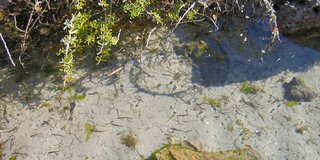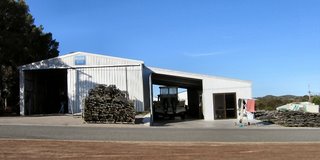
Emus walk in pairs
We are definitely staying for a few days. So first, some laundry.
Gloria was only too happy to lend some wooden pegs and pointed out the best ‘Hills hoist’ where the sun shines all day long. “We’re in that caravan up there, the ‘Travelling Dinosaur’. We’ve been here since last year.”
Martin was a sheerer in his younger days. “I could do 200 on a good day,” he boasted. We asked him if a sheep can get up on it’s own if it had rolled over on its back. We met a stray sheep on the road a day earlier. We stopped, but the poor frightened creature ran panicking from the sound of the van straight through a fence, rolled over on its back and then its side. We weren’t sure what to do. “The bugger should be right. Could have pink eye and not know where he was goin’. And unless he had toxemia (bloating) he’d get up in no time. They do this all the time”, he reassured these city slickers.
Took a walk along the marked out path from the caravan park . Oyster Walk. Aptly named for the bays are full of oyster beds. A school of tiny fish dart through the clear water. Grey crabs crawl over the sea grass.

An elderly man greets us with “D’ya think it’ll rain today?” There’s not a cloud in the sky, the sun is high in the sky and a pelican preens himself on the jetty.
A walk up the hill beyond the ”town center”, composed of the general store, the post office and the petrol station, is the industrial area. We hesitate for a moment. Do we really want to go that way? I ask Chewie. “Of course we do, that’s usually where the best rusty textures are” he said and we walked on.
The ‘industrial area’ as it is called, consists of a few large aluminum buildings. It is surprisingly clean, fresh and quiet if not for the occasional ‘ute’ or forklift driving by.
Wet suits hang over some railings, gloves lie in the warm sunshine, drying. Small rectangular black oval baskets are piled almost everywhere. This is the heart of the Coffin Bay oyster industry.

At one of the sheds, people are busy unloading todays harvest. One of them approaches. “G’day, we’re from Melbourne, this looks fascinating. Mind if we take some pictures?” we ask. “No worries, go for it.” says Bill.
Bill is the man who makes sure that the city folk can order their fresh “Dozen Kilpatrick” when they go out for dinner at the end of the week. Except for a green and red knitted beanie he wears atop his wind-blown, suntanned face, he is all in blue. The colour of the sea. Blue pants (no center creases), blue jumper (with a zip up roll neck for those chilly mornings). “It’s 15 kms out to the oyster beds in the bay”. We asked how they cope with the cold mornings. It was -.5C overnight. “The water temperature is 11 degrees today. It’s warmer in than out. But when the sun comes up and hits the bay it’s glorious.” he said with a smile on his face and a twinkle in the eye.
Chewie is fascinated. The boat gets towed from the jetty to the shed come factory on the top of the hill in the industrial sector. Two men unload each of the beds and empty them into a computerized sorting machine. A screen shows each individual oyster as it passes through. A gloved pair of hands at the other end does a final human check and discards the ones that aren’t just right. “These guys are gonna get picked up this afternoon to go to Port Augusta and then on to Melbourne. And other places like Sydney and that. They’ll be there by Thursday.”

Bill is the man
The post office has a Community internet center, run by volunteers from the community for the community. “No mail today, Dan.” “No worries.” I recognized him by his blue beanie. It was the man who asked about the rain. “Maybe tomorrow”, he said with a mischievous wink.
A true community. Where people walk in pairs, just like the emus.
No comments:
Post a Comment